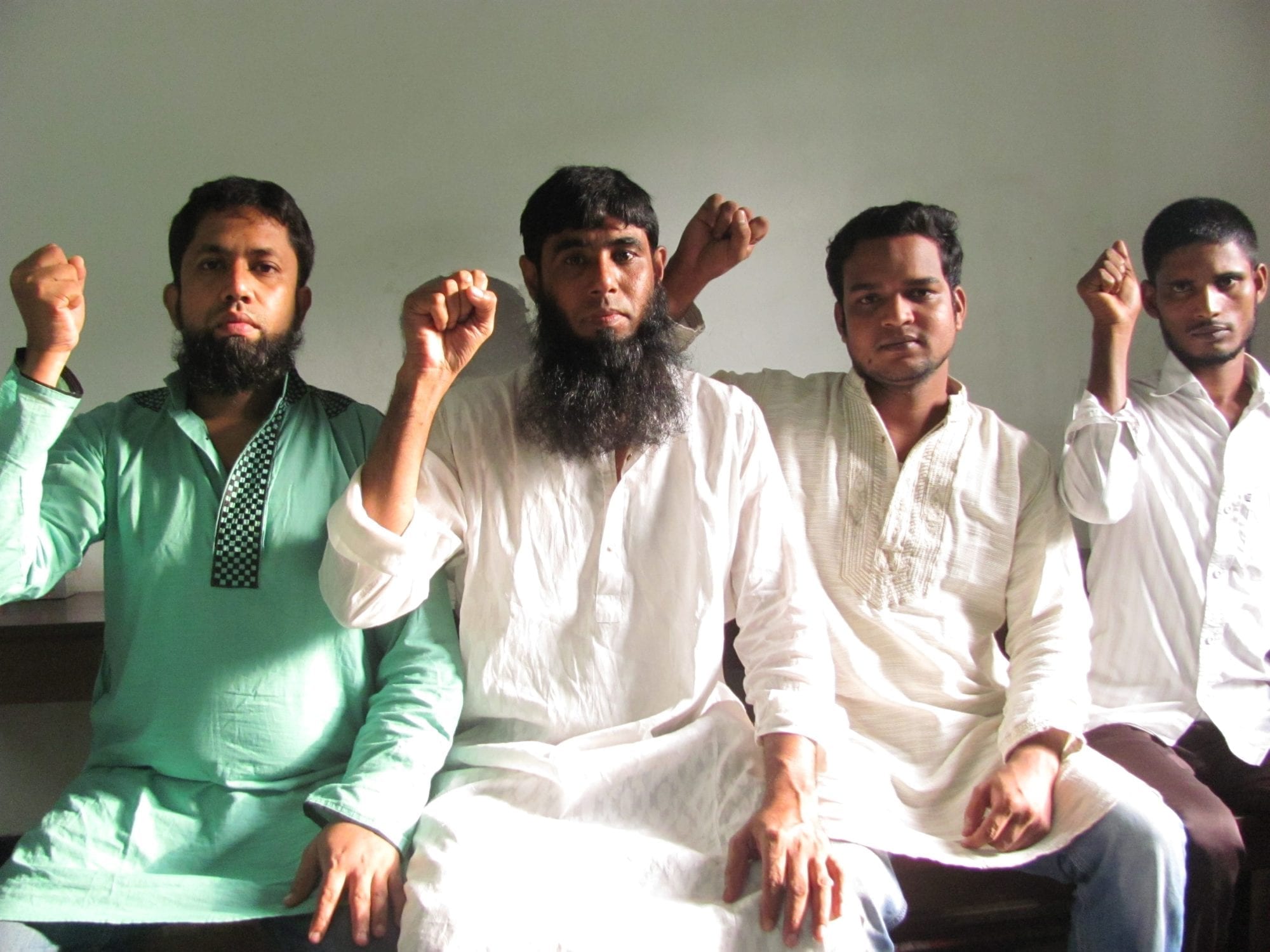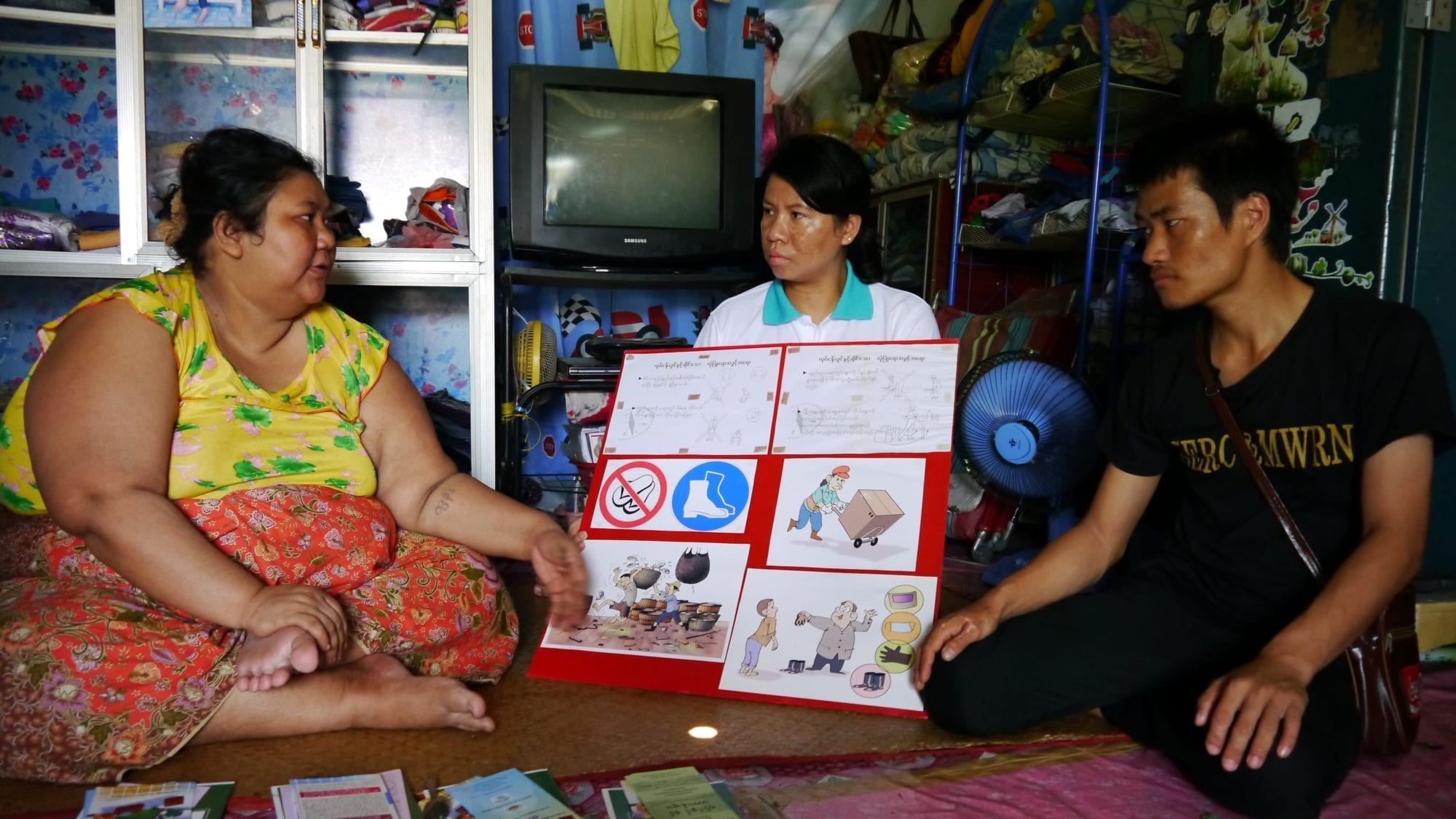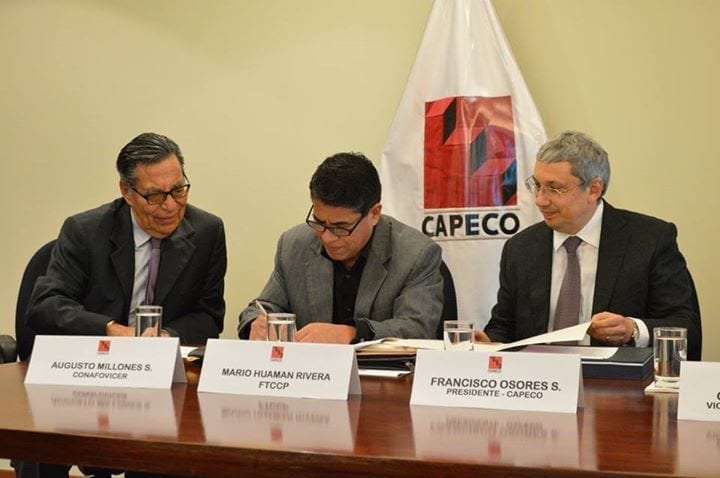
Sep 11, 2015
A second Honduran union leader and participant in the Network Against Anti-Union Violence in Honduras has been threatened with death if he does not stop his union-related work, according to the human rights group Aci Participa.
Tomás Membreño Pérez, president of the agricultural workers union, Sindicato de Trabajadores de la Agroindustria (STAS), received death threats by phone and on Facebook in recent days and was followed as he traveled to the Santa Rita banana plantation where he is helping workers get a voice on the job.
One Honduran union leader has been murdered this year who also was a member of the anti-violence network and another union leader disappeared and is presumed dead. In July, the president of the health care union reported receiving death threats. (ACI Participa has documented more such cases.)
The network, comprised of union activists and ACI-Participa, was launched late last year to combat government corruption and stand up to increasing violence and threats against union activists. Among them, José Maria Martinez, an active union member who hosted a popular pro-worker radio show, was forced to flee Honduras twice because of death threats in 2013 and 2014.
Honduras: No Progress in Addressing Worker Rights
Pérez also is active on the Honduran labor movement’s Central American Free Trade Agreement (CAFTA) Complaint Commission, which has received numerous documented cases of worker rights abuse in the banana and agricultural sectors in Honduras.
The United States passed the CAFTA agreement in 2005. In 2012, the AFL-CIO and 26 Honduran unions and civil society organizations filed a complaint under CAFTA’s labor chapter with the U.S. Department of Labor’s Office of Trade and Labor Affairs alleging the Honduran government failed to enforce labor rights under its labor laws. The trade and labor affairs office accepted the complaint in 2014, and the United States is waiting for the Honduran government to present its corrective plan of action. In a February 2015 report, the U.S. Trade and Labor Affairs office says Honduras has made virtually no progress since 2012.
‘Overwhelmed’ by Violence, Attacks on Worker Rights
The Santa Rita banana plantation is included in the 2012 complaint under its previous name, Tres Hermanas. As the AFL-CIO points out, Santa Rita, now a subsidiary of Chiquita, owes full-time and temporary workers nearly $50,000 for unpaid overtime and other wages.
In addition, Honduran unions reported that the Labor Ministry selected an employer-controlled union to represent workers at the plantation, even though it is documented that STAS is supported by 136 workers out of 145. In a July 2015 letter, the AFL-CIO asked the Honduran secretary of Labor and Social Security to address the issue.
Last October, a delegation of U.S. union leaders to Honduras reported that they were “overwhelmed” with the information they received from union activists about widespread noncompliance with laws, including attacks against labor leaders, a lack of compliance with minimum wage laws and an unresponsive government. The delegation issued a scathing report on the conditions.

Sep 2, 2015
Garment workers at Sin Sin Poly factory in Bangladesh’s export processing zone (EPZ) won increased pay and leave benefits in August after forming a workers’ welfare association and successfully negotiating with management.
Mehedi Hasan, 35, was among workers helping form the association. When Mehedi began work at the factory, where he was hired to make plastic and polyethlene bags, he says instead he was asked to perform janitorial duties.
“That disappoints me a lot. Though I was appointed as a factory worker, I was asked to clean the factory. There were other problems as well,” he says.
“From that day, I promised to myself that I would work for a change in the factory,” Mehedi added.
Staying Strong to Form Their Association
Mehedi joined with Dalim Sarkar, 30, Russel Sarkar, 28, and Mohammad Alamin, 25, and other workers to form a Workers’ Welfare Association to represent the 100 workers in the factory, formerly called Ju Hyung Co. Ltd.
“The initial stage (involved much) struggling,” says Dalim Sarkar, association secretary. “We had to work hard to convince other workers about the benefit of a (Workers’ Welfare Association).”
“We are now getting increased money for our meal and transportation,” said Alamin.
Garment worker Russel Sarkar said that under the agreement, workers also will receive paid leave for the first time. Some workers have begun to receive performance promotions, a practice the company had ended.
In Bangladesh’s ready-made garment industries, workers often face abusive employers, low pay and unsafe working conditions. EPZ workers cannot form unions. However, in 2004, Bangladesh passed a law passed enabling workers in the special zones to form workers’ associations.
Associations are permitted to represent workers in disputes and grievances, negotiate collective bargaining contracts and collect membership dues, but cannot affiliate with labor unions, nongovernmental organizations or political organizations outside of the EPZ.
“Now other factories in the EPZs are inspired by us,” Dalim says. “If there is a federation in EPZ, our fight for workers’ rights will be easier,” he added.
Workers Associations Spreading
Despite obstacles, more workers are forming associations in factories throughout Bangladesh’s export processing zones. Associations now represent workers at 53 of the 102 factories in the Dhaka EPZ alone.
Bangladesh derives 20 percent of its income from exports created in the EPZs, which are industrial areas that offer special incentives to foreign investors like low taxes, lax environmental regulations and low labor costs. Some 405,166 workers, the vast majority of them women, work in 437 factories in Bangladesh’s eight EPZs.
The Solidarity Center holds trainings for garment workers on labor law and union rights and strategic planning and leadership development. The Solidarity Center also mentors union organizers and workers welfare association leaders and helps workers resolve workplace issues.

Aug 26, 2015
Nurul Islam and three other men from his village in Burma’s Rakhine state believed the Rohingya brokers who promised to take them to Malaysia for jobs. Instead, the men were herded at gunpoint deep into a forest with 350 other migrant women, men and children, and told if they did not pay up to $2,300 each, they would be beaten and killed.
Beaten by his captors over four days, Nurul, 30, eventually called his uncle in Malaysia who agreed to pay the traffickers. But after he was released and contacted the police, he was taken to a government shelter where he again was deceived—a government official demanded $560 dollars for his release.
In a rare case of justice for survivors of human trafficking, the official, Anat Hayeemasae, a member of the Satun Provincial Administration Organization, was sentenced yesterday to more than 22 years in prison for human trafficking and ordered to pay Nurul $3,560.
Lawyers Working with HRDF Key to Prosecution
The success resulted from a more than year-long effort by lawyers working with the Human Rights and Development Foundation (HRDF), a Solidarity Center ally. They joined with the Rohingya Association of Thailand to investigate and file charges.
The result, says HRDF Secretary General Somchai Homlaor, “serves the objectives of HRDF’s Anti Human Trafficking in Labor Project to provide legal aid to a victim of human trafficking and to ensure the right of the victim of human trafficking to have access to justice process.”
Anat was found guilty of violating Thailand’s 2008 Anti-Trafficking in Persons Act and its 1979 Immigration Act, among other charges. He was among government officials from the Immigration Office who rescued Nural in March 2014 at Songkhla’s Hat Yai bus terminal.
Massive Human Trafficking in Thailand
Anat’s prosecution is especially noteworthy in an area where massive human trafficking occurs with impunity. In May, hundreds of bodies were found in 139 mass graves at suspected human trafficking camps on the border of Malaysia and Thailand. According to local news, Malaysian border patrol knew about the camps for 10 years, says Karuppiah Somasundram, education director for the Malaysian Trades Union Congress (MTUC). No arrests have been made.
Last month, the U.S. State Department retained Thailand on the bottom ranking of its annual Trafficking in Persons Report. The “Tier 3” ranking means Thailand is failing to comply with minimum standards to address human trafficking.
Migrant workers, primarily from Burma and Cambodia, work in slave-like conditions on Thai fishing boats, fueling the country’s $7 billion seafood export industry and making it the world’s third-largest exporter. Many migrant workers toil in forced labor and are held against their will on the boats where they are beaten and even killed. A Guardian series last year reported on the horrors endured by migrant workers who often are tricked by labor recruiters and sold into bondage. Estimates of migrant workers in Thailand range from 200,000 to 500,000.
A 2013 survey by the International Labor Organization (ILO) of nearly 600 workers in the Thai fishing industry found that almost none had a signed contract, and about 40 percent had wages cut without explanation. Children were also found on board. A 2009 U.N. report found that about six out of 10 migrant workers on Thai fishing boats reported seeing a co-worker killed. In another report, migrant workers say they were trafficked and forced to work for up to 20 hours per day with little or no pay. Many migrant workers in Thailand are in debt bondage.

Aug 24, 2015
Construction workers in Peru are celebrating a new contract that significantly improves wages and benefits, and are hailing a new legislative order, which in part addresses ongoing violence against union members in the building and construction trades.
The new one-year contract gives workers up to a 5 percent wage increase and includes education benefits for workers’ children up to age 22. Construction workers also will receive bonuses for hazardous work, time off when working more than 27 consecutive days on a project, and an additional 25 percent of their wage when working at night.
The FTCCP also negotiated an agreement with the Peruvian Chamber of Construction to conduct free professional training courses at the federation’s training and recreation centers in conjunction with the National Training System for the Construction Sector Ministry of Labor and Employment Promotion.
“The collective bargaining agreement benefits the workers, democracy and the country,” La Federación de Trabajadores en Construcción Civil de Perú (Federation of Civil Construction Workers of Peru, FTCCP) said in a statement.
With the new contract, FTCCP members’ average base pay will be $750 per month, and up to $1,250 per month with overtime. The vast majority of Peru’s workers, 70 percent, are employed in small and micro enterprises where workers generally earn a $250 per month minimum wage. Approximately half of workers in the construction sector are union members. Non-union workers can request “me too” clauses for their individual contracts that bring them up to the union wage scale.
In another sign of construction workers’ growing influence, Peru’s executive branch published a legislative decree in mid-August that charges police special units with preventing violence against construction workers.
More than a dozen construction union leaders have been murdered in the past five years, most recently last month, when Miguel Cotelo Villanueva was murdered leaving a union organizing meeting in Casma, Peru.
In addition, the decree takes steps to ensure safety and health on construction sites by requiring local governments to notify the police when construction permits have been filed, enabling timely workplace inspection and enforcement of labor and safety standards.
The decree also mandates that union dues must be paid by the employer into the union’s financial institution.
The FTCCP is a member of the Confederación General de Trabajadores del Perú (General Confederation of Workers in Peru, CGTP), both Solidarity Center allies.
Aug 24, 2015
More than 60 people from Latin America—including the Dominican Republic, Chile, Colombia and Honduras—along with U.S. representatives met last week in Brazil to affirm labor’s continued commitment to racial equality through a broad-based economic justice movement, mark the 20th year of trade unions’ efforts to eliminate race-based economic inequality in the Americas, and call for Colombians of African descent to be included in peace talks in that country.
“There is a persistent, violent and dehumanizing racism in our societies. As Afro-descendants, we must continue the fight for our dignity,” said Francisco Quintino, president of the Inter-American Union Institute for Racial Equality (INSPIR), a labor coalition dedicated to fighting for racial justice in the Americas.
“This is an issue of humanity,” he said.
INSPIR has worked with trade union partners and like-minded allies across the Americas to combat racial and ethnic discrimination in the workplace and give union leaders tools to promote equality in their organizations and society since its founding by the AFL-CIO, three Brazilian national centers (CUT, Força Sindical and UGT) and the Trade Union Confederation of the Americas (TUCA) in 1995.
“The tie… is our common cause of fighting racism, within the labor movement, and hopefully, too, as part of a broader social and economic justice movement for racial equality,” said Joslyn Williams, general secretary of INSPIR, who also represented the AFL-CIO at the conference as D.C. Metro Labor Council president and a trustee for the U.S.-based Coalition of Black Trade Unionists (CBTU).
Fred Redmond, vice president of the United Steelworkers (USW), also attended on behalf of the AFL-CIO and CBTU.
Delegates to the Continental Conference passed a resolution calling for Colombians of African descent to be represented in peace negotiations and post-conflict implementation in that country.
More than 150 people attended the opening ceremony of the 20th Anniversary Celebration and Continental Conference, held August 17–19, 2015, in São Paulo. Brazil’s Minister of the Promotion of Racial Equality Policies, Nilma Lino Gomes, keynoted the event.
The Solidarity Center works with INSPIR in Brazil to empower Afro-descendant workers to fight for their rights and overcome the tragic legacy of the more than 400 years of slavery, through education, collective bargaining and policy advocacy.




